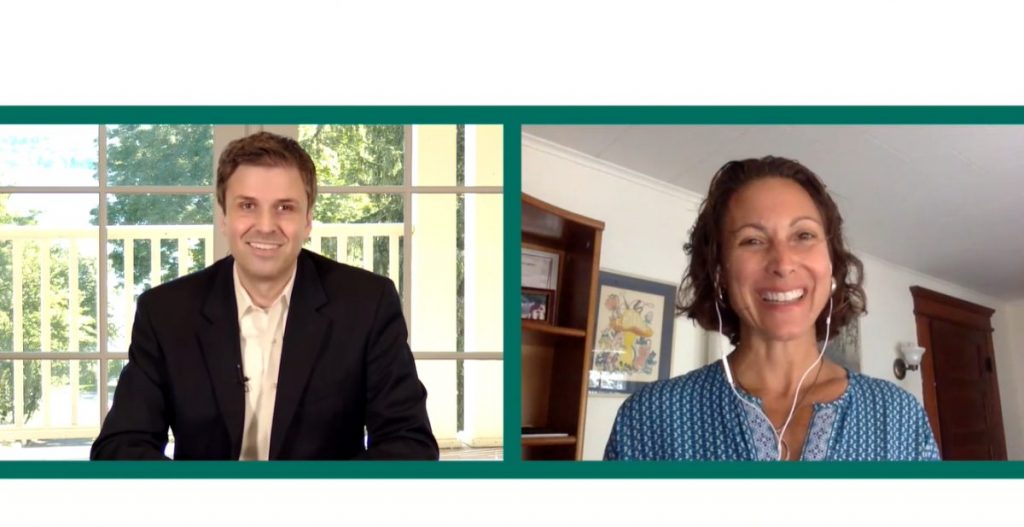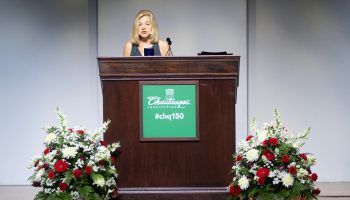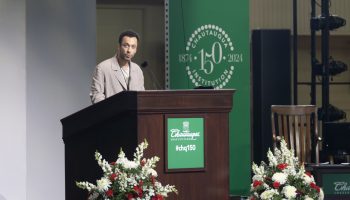
A larger amount of mail-in ballots for the 2020 presidential election may force states, particularly swing states, to count the ballots into the next morning.
Emily Bazelon, staff writer for The New York Times Magazine and best-selling author, said the process may be slowed even more because some states have a rule that election officials cannot count ballots until Election Day in order to prevent fraud. Many ballots may arrive at the last minute, and states have never counted a large number of mail-in ballots before.
“There may be totally legitimate reasons why the state election officials just haven’t counted all, or even a large fraction, of the absentee ballots on election night — and we should all be ready for that,” Bazelon said.
She said the media, herself included, has a broad responsibility to prepare audiences so they understand the process of counting every ballot, “as opposed to (audiences perceiving) some evidence that something fraudulent is going on.”
“I do worry about that potential for litigation, but I think the headline going into election day is that we should all be prepared to be patient,” Bazelon said, “and obviously watching to make sure that these results are fair and legitimate and regular — but not to be worrying that if we don’t have an immediate result.”
At 10:45 a.m. EDT Thursday, Aug. 20, 2020, on the CHQ Assembly Video Platform, Bazelon discussed how voting was laid out by the Founding Fathers, how the pandemic and voting suppression may affect the 2020 election, and possible Constitutional amendments that can improve American democracy, as part of the Chautauqua Lecture Series Week Eight theme of “Reframing the Constitution.” Her conversation, with Vice President and Emily and Richard Smucker Chair for Education Matt Ewalt, was titled “Voting and the Constitution.”
Ewalt asked Bazelon to explain how the right to vote is not explicitly protected in the Constitution.
Article One describes how senators and representatives will be elected, and the fourth section states that the time, places and manner of election will be determined by each state. The 14th Amendment expanded voting rights to Black Americans, the 26th Amendment lowered the voting age from 21 to 18 and the Voting Rights Act ensured that voters, particularly Black voters in the South, were not subject to “overt barriers” like poll taxes and literacy tests.
“What we still are lacking is a sense that there are limits to what states and localities can do to close polling places — for example, to change the way elections are shaped in a way that can affect representation,” Bazelon said.
Bazelon said the 2013 Supreme Court decision in Shelby County vs. Holder “really, in some ways, gutted a key provision of the Voting Rights Act,” by no longer requiring that the Justice Department approve changes to the electoral process by state and local governments. Since this decision, she said thousands of polling places have closed across the country, particularly in the South.
The U.S. has also had disputes over voter identification laws, and Bazelon said tens of thousands of votes were removed since Shelby County vs. Holder if the state and local election officials found that they were “inactive voters.”
“When you see these kinds of moves that really limit the franchise, (making) it harder for people to vote,” Bazelon said, “that makes me wonder if we had this Constitutional guarantee, (we might) be better equipped to address them.”
Ewalt then asked how the April 7, 2020, Wisconsin presidential primary was affected by the COVID-19 pandemic.
“I think, unfortunately, that (the) Wisconsin primary was a full-on disaster,” Bazelon said.
She said at that time, in the face of COVID-19, election officials in Wisconsin were debating how to handle the election — whether to extend deadlines for absentee ballots and what to do about workers uncomfortable staffing the polls. Bazelon said that staffing problems may occur again in November, as volunteers tend to be older retirees who may be at higher risk of the virus.
She said Wisconsin had never had more than 2-3% of the electorate vote by mail, but saw large increases in mail-in ballots for the primary.
“They just had a lot of trouble getting all the ballots out in time and then back in time,” Bazelon said. “Wisconsin, confusingly, doesn’t have a postmark requirement for returning absentee ballots, and so there were a lot of people whose ballots were not received by election day as the law required, and they were disenfranchised. This is upwards of 10,000 people.”
Another problem — with a lack of workers and concerns of the pandemic spreading — is that cities, such as Milwaukee, closed “almost every single polling place. So you saw a big city that usually has hundreds of polling places having only a handful,” she said.
“There were these very long lines of folks lining up to vote, having to spend hours, sometimes in the rain. This is not what we want to see on election day; that’s just way too big a burden,” Bazelon said. “Unfortunately, after the election, contact tracers found that dozens of people got the coronavirus, and that may have been linked to their either working or going to the polls.”
Ewalt asked what people should pay attention to in the courts in the near future related to voting rights.
Bazelon said dozens of lawsuits surrounding voting rights are occurring, such as the Republican National Committee having $20 million in reserve to spend on election litigation. She said that the committee is trying to challenge Nevada’s plan to give everyone an application for an absentee ballot and Pennsylvania’s plan for having secure drop-off boxes for collecting mail in order to take pressure off the United States Postal Service.
She said Democrats are trying to increase enfranchisement; for example, if a person submits an absentee ballot and their signature does not look correct, they will have a chance to verify it, which is called signature curing. She compared this to the “hanging chads” of the 2000 presidential election, where many ballots were thrown out because of the way some voters punched their ballot.
Ewalt asked Bazelon to expand on recent discussions about Constitutional amendments, like the renewed interest in the Equal Rights Amendment.
Bazelon said people are debating an amendment setting term limits for federal judges, who can potentially serve in their position for 40 to 50 years. When the Founding Fathers wrote the Constitution, she said they did not know people would want to be federal judges in the future.
“It was kind of a crappy job. (In those days) you had to literally ride a circuit on horseback around the original states to do your job,” Bazelon said. “It wasn’t particularly prestigious, and so life tenure was this extra benefit they were dangling in front of people. Also, (there were) very different average life expectancies than they have now.”
She said people are now chosen for the Supreme Court partly because of their ages, and the hope that they will stay for many decades.
“I would argue that’s just too much power to give a small number of people, to give nine people,” Bazelon said. “They get to have the final say of the meaning of the Constitution, and in many cases law, in this country for a very extended period of time.”
But if Supreme Court Justices had staggered, 18-year terms, then every president would appoint two judges.
“We wouldn’t have the same incredible Sturm und Drang over each single appointment, because it would be much more regularized, and that I think would also be healthy for our democracy,” Bazelon.
Additionally, Bazelon said she was originally dismissive of the effort to ratify the Equal Rights Amendment when the push was relaunched a few years ago.
“I have changed my tune about it, in part because I watched the show ‘Mrs. America,’ which was all about the original 1970s effort to pass the ERA. I understood much better what was at stake,” Bazelon said. “This is my own lack of knowing our nation’s history, I suppose, but I understood much more that it was this foundational fight, and what they were asking for was just to be treated equally.”
She said since the 1970s, when ERA was passed through Congress — but not 35 states — many of the demands of ERA supporters have become law, and it has been harder to discriminate based on sex in the United States. Bazelon said the new ERA may address pregnancy discrimination, and, potentially, “a more secure anchor for the right to access to abortion.”




